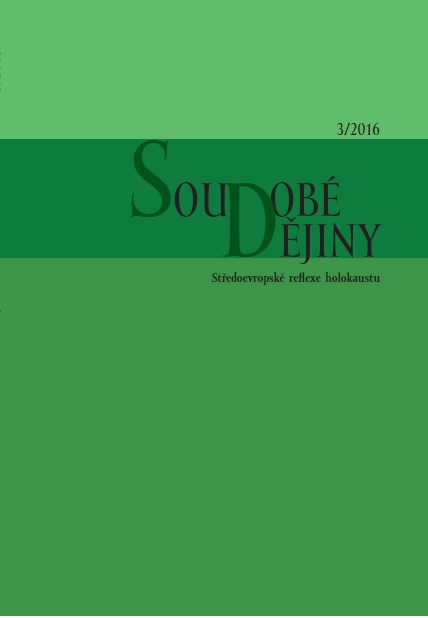Jak si disidenti připomínali holokaust
Dissidents and the Holocaust
Independent Thinking about the "Night of Broken Glass" in the German Democratic Republic and the Warsaw Ghetto Uprising in the Polish People´s Republic
Author(s): Stephan StachContributor(s): Petr Dvořáček (Translator)
Subject(s): Jewish studies, Comparative history, Recent History (1900 till today), WW II and following years (1940 - 1949), Post-War period (1950 - 1989), History of the Holocaust, Politics of History/Memory
Published by: AV ČR - Akademie věd České republiky - Ústav pro soudobé dějiny
Keywords: Jews;Holocaust;GDR; Poland;Dissent;Memory;Kristallnacht;Warsaw Ghetto Uprising;
Summary/Abstract: This is a Czech translation of ‘Dissidentes Gedenken: Unabhängiges Holocaustgedenken in der DDR und der Volksrepublik Polen’, in Peter Hallama and Stephan Stach (eds), Gegengeschichte: Zweiter Weltkrieg und Holocaust im ostmitteleuropäischen Dissens (Leipzig: Leipziger Universitätsverlag 2015, pp. 207–36). The article is concerned with commemoration ceremonies on Holocaust Memorial Days – the ‘Kristallnacht’ of 9 November 1938 in the German Democratic Republic and the Warsaw Ghetto Uprising of 19 April 1943 in the Polish People’s Republic – organized by dissidents in both countries in the 1980s. These commemorations were both an attempt by emerging civil society to reclaim interpretations of history which were different from the master narratives produced by the State-Socialist regimes and were also part of the opposition movements’ political struggle with their governments. In a comparison of these events, the author concludes that despite all their differences they constituted an often overlooked but important contribution to public memory in Poland and Easter Germany and also motivated the two societies to reflect on the meaning of the Shoah.
Journal: Soudobé Dějiny
- Issue Year: XXIII/2016
- Issue No: 3
- Page Range: 347-370
- Page Count: 24
- Language: Czech

